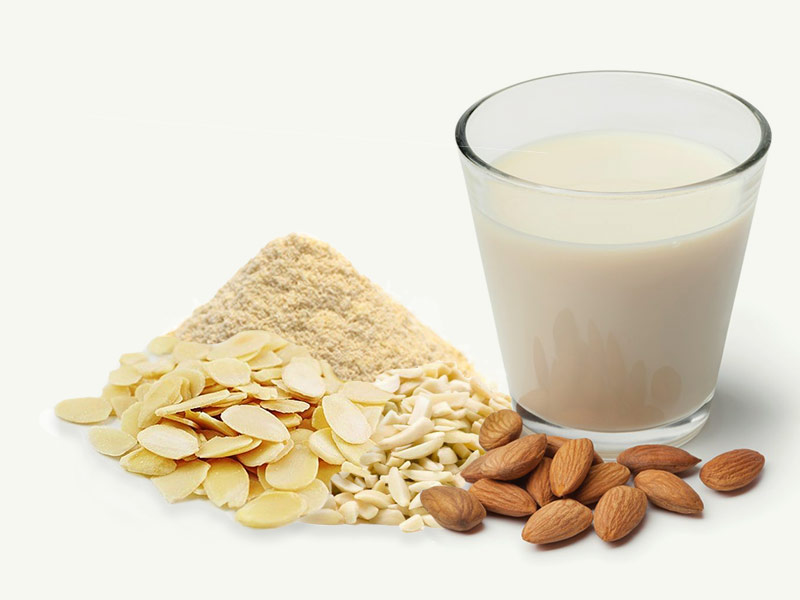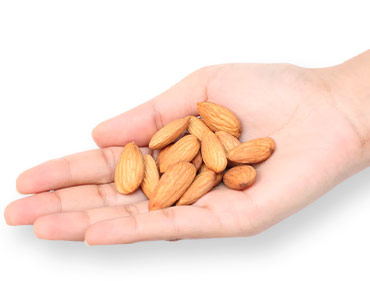UAL advises that Health Benefit information on this website is provided for informational purposes only. Nothing contained in this site is intended to be used as medical advice and it is not intended to be used to diagnose, treat, cure or prevent any disease, nor should it be used as a substitute for your own health professional’s advice.
Health Benefits of Almonds
Almonds are the most consumed tree nut in the world. Highly nutritious, they are rich in healthy fats, antioxidants, vitamins and minerals.
The almonds you buy in stores usually have the shell removed, revealing the edible nut inside. They are sold either raw or roasted. Almonds are also used to produce almond milk, oil, butter, flour, almond paste and marzipan.
Enjoying a handful of nuts (30g) regularly as part of a healthy diet may reduce your risk of heart disease and type 2 diabetes and can help with weight management – a handful (30g) serve of almonds is about 20 nuts.

Almonds - Loaded with Antioxidants
Almonds are a fantastic source of antioxidants. Antioxidants help protect against oxidative stress, which can damage molecules in your cells and contribute to inflammation, ageing and diseases.
Almonds - High in Vitamin E
Vitamin E is a powerful antioxidant. This means that it protects our cells from damage, helping to maintain a healthy heart and blood vessels. Vitamin E also works best in foods that contain some good dietary fat, like almonds, to help its absorption.
Almonds are among the world’s best sources of vitamin E. A 30 g serve of almonds will provide you with over 70 % of the Recommended Daily Intake (RDI). Vitamin E is an important fat-soluble vitamin and antioxidant which can help maintain a healthy heart. Getting plenty of vitamin E from foods is linked to numerous health benefits. These antioxidants tend to build up in cell membranes in your body, protecting your cells from oxidative damage.
Almonds - Assist with Blood Sugar Control
Nuts are low in carbs but high in healthy fats, protein and fibre. This makes them a perfect choice for people with diabetes.
Almonds are also extremely high in magnesium, a mineral that many people don’t get enough of. High magnesium intake may offer major improvements for metabolic syndrome and type 2 diabetes.
Magnesium in Almonds - Benefits Blood Pressure Levels
The magnesium in almonds may additionally help lower blood pressure levels. High blood pressure is one of the leading drivers of heart attacks, strokes and kidney failure.
Low magnesium levels are strongly linked to high blood pressure, indicating that almonds can help control blood pressure.
Almonds - Lower Cholesterol Levels
High levels of LDL lipoproteins in your blood — also known as “bad” cholesterol — is a well-known risk factor for heart disease.
Eating one or two handfuls of almonds per day can lead to mild reductions in “bad” LDL cholesterol, potentially reducing the risk of heart disease.
Almonds - Prevent Harmful Oxidation of LDL Cholesterol
Almonds do more than just lower LDL levels in your blood. They also protect LDL from oxidation, which is a crucial step in the development of heart disease. Oxidised cholesterol is sticky and can block arteries. Almond skins are a rich source of antioxidants called polyphenols which may help to prevent the oxidation of cholesterol.
Reduce Hunger, Lower Your Overall Calorie Intake
Almonds are a filling snack!
Almonds are high in protein and are a source of dietary fibre. The combination of protein and dietary fibre found in almonds can help keep you feeling fuller for longer. That’s good news for people wanting to avoid those afternoon hunger pangs. Almonds can also help us to get all the essential fats our bodies need every day.
Almonds are low in carbs and high in protein and fibre. Studies show that eating almonds can increase fullness and help you eat fewer calories.

Almonds - For Weight Loss
Nuts contain several nutrients that your body struggles to break down and digest. Despite being high in fat, almonds are definitely a weight-loss-friendly food.
Though almonds are high in calories, eating them doesn’t seem to promote weight gain. Some studies even suggest the opposite, showing that almonds can enhance weight loss.
Almonds contain lots of healthy fats, fibre, protein, magnesium and vitamin E.


